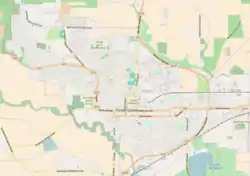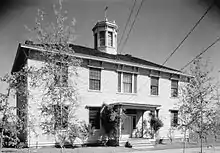Tualatin Academy
Tualatin Academy was a secondary school in the U.S. state of Oregon that eventually became Pacific University. Tualatin Academy also refers to the National Register of Historic Places-listed college building constructed in 1850 to house the academy, also known as Old College Hall. The building now serves as the Pacific University Museum, and is one of the oldest collegiate buildings in the western United States.
| Type | Secondary school |
|---|---|
| Established | 1848 |
| Location | , , |
| Fate | Closed in 1914 Pacific University continued |
Academy
Congregational minister Harvey L. Clark started a missionary school in 1841 just north of East Tualatin Plains, now Hillsboro.[1] The school was soon moved to West Tualatin Plains (now Forest Grove) where in 1847 Clark was joined by Tabitha Moffatt Brown, the Mother of Oregon.[1] The two then operated a school for settler's children and Brown opened a school for orphans, opening in 1848.[1][2] The Reverend Henry H. Spalding’s wife Eliza was hired to teach at the school the first year.[2] In 1848, Presbyterians and Congregationalists determined to start a school with Clark and Brown's school as the location.[3] The Oregon Territorial Legislature chartered the Tualatin Academy on September 29, 1849.[1]
Founding trustees of the school included Clark, P. H. Hatch, George H. Atkinson, James M. Moore, and Osborne Russell among others.[1] In 1854, when college classes were added, Pacific University was split from the Academy.[1] Tualatin Academy continued alongside the university until it was closed in 1914, at a time when many private high schools disappeared with the growth of public schools.[1]
Building
Tualatin Academy | |
 Building in 2009 | |
 | |
| Location | Pacific University campus 2043 College Way Forest Grove, Oregon |
|---|---|
| Coordinates | 45°31′13″N 123°06′39″W |
| Area | 0.09 acres (360 m2)[4] |
| Built | 1850 (construction); 1894, 1964, 2003 (relocation)[4] |
| Architectural style | Colonial Revival/Georgian Revival[4] |
| NRHP reference No. | 74001722 |
| Added to NRHP | February 12, 1974 |
The Tualatin Academy building, now known as Old College Hall, is a two-story wood-frame structure. Built by the community in July 1850 in barn raising fashion, it replaced a log cabin previously used by the school.[5] A second identical building was added 18 years after Old College Hall and named Academy Hall.[2] Academy Hall burned in 1910.[6] Old College hall later was the Science Hall for the university and known as the Chem Shack to students from 1900 to 1950. In 1949, the science department moved out and the building was renamed as Old College Hall. That year two rooms upstairs became the Pacific University Museum.[7]

Sitting atop its hipped roof is an octagonal shaped louvered belfry, similar to one that was on the Oregon Institute building. The rectangular shaped hall is divided by a centralized cross hall.[5] Colonial Revival in style,[4] the structure was added to the National Register of Historic Places as Tualatin Academy in 1974.[8] The downstairs of the building houses the Price Memorial Chapel and meeting space.[7] It is the oldest college building in the state[9] and was still in use as a museum and chapel in 2017.[10]
Pacific University Museum
The second floor of Old College Hall contains the Pacific University Museum with exhibits about the history of the University, including items from school founder Tabitha Moffatt Brown, first school president Sidney Harper Marsh, alumni and friends. Visits are by appointment with the Office of the President. The museum opened in 1949 as part of the school's centennial celebration.[11]
References
- Corning, Howard M. Dictionary of Oregon History. Binfords & Mort Publishing, 1956. p. 190.
- Buan, Carolyn M. This Far-Off Sunset Land: A Pictorial History of Washington County, Oregon. Donning Company Publishers, 1999.
- Horner, John B. (1919). Oregon: Her History, Her Great Men, Her Literature. The J.K. Gill Co.: Portland. p. 159
- O'Brien, Elizabeth J. (2003), National Register of Historic Places Registration Form: Old College Hall/Tualatin Academy (PDF), begins at PDF p. 7, retrieved December 20, 2017.
- Walton, Elisabeth (Oct 1973). "A Note on William W. Piper and Academy Architecture in Oregon in the Nineteenth Century". The Journal of the Society of Architectural Historians. 32 (3): 231–238. doi:10.2307/988795. JSTOR 988795.
- Centers, Ken (2015). "Remember Forest Grove When: A Look at the City's Lost Treasures. The Oregonian/OregonLive, Feb. 14, 2015". The Oregonian/OregonLive. Retrieved March 21, 2016.
- Colby, Richard N. “Tour of time: An open house will make it easy to take in the county’s hidden treasures, historic and otherwise, in one swoop”, The Oregonian, April 23, 1998, West Zoner, p. 1.
- "Department of the Interior, Heritage Conservation and Recreation Service: National Register of Historic Places; Annual Listing of Historic Properties", 44 FR 7416 (February 6, 1979), at p. 7571.
- Hartwig, Paul B. (November 1973), National Register of Historic Places Inventory — Nomination Form: Old College Hall (PDF), retrieved December 20, 2017.
- Pacific University. "History of Pacific University". Archived from the original on December 21, 2017. Retrieved December 20, 2017.
- "Archived copy". Archived from the original on 2009-05-03. Retrieved 2009-07-13.CS1 maint: archived copy as title (link) University Services & Resources: Old College Hall and the Pacific University Museum